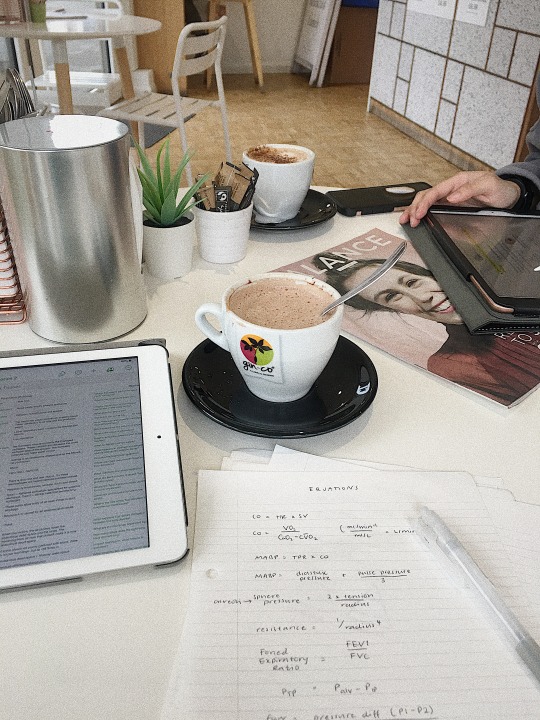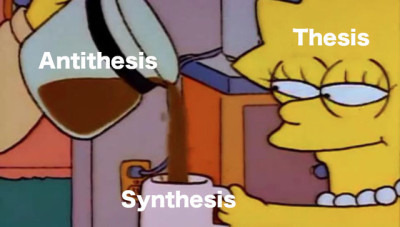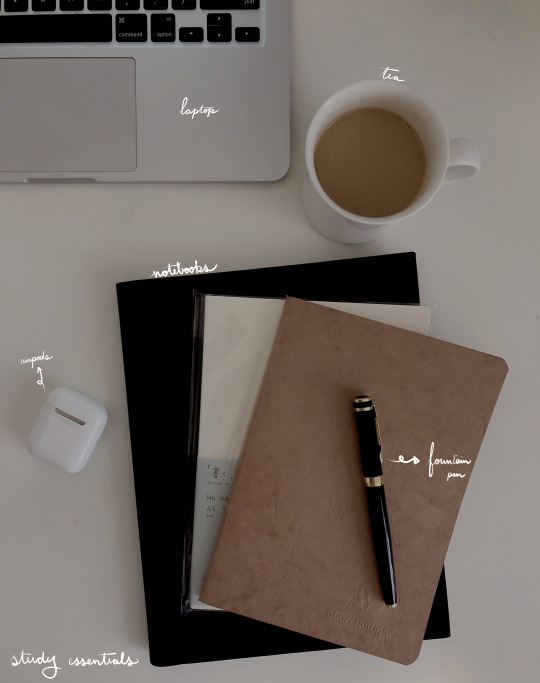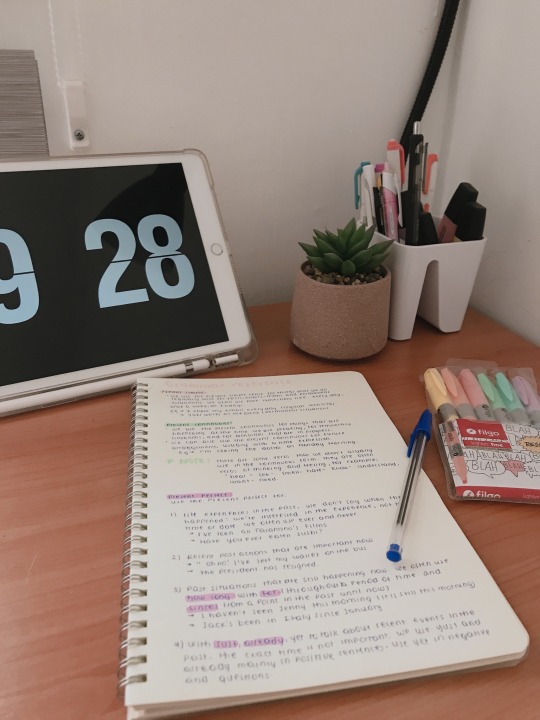sparksstudies
511 posts
Winn/ 22/ College senior studying English and Sociology/ I follow from @luckycatdiner and track #sparksstudies
Don't wanna be here? Send us removal request.
Photo


using the semester break to pick up a new skill (much to the joy of my flatmates). also practicing loads for my intermediate examination next year
5K notes
·
View notes
Photo



08.01.2020 It’s always a score when you come across empty cafes!
5K notes
·
View notes
Text


sunny coffee shop dates 🍂✨☁️☕️
Instagram: kokokourtney
2K notes
·
View notes
Text


well deserved library spot (it was a serious quest) and going through old old books for my internship
3K notes
·
View notes
Text


15th of March 2021
This morning I prepared for my lab test, and this afternoon I had a lab about Fe in vitamin pills with AAS.
Luckily we were done early so I could also do my food shop and I prepared my lecture for tomorrow morning. I tried to read a bit in my book today, but I didn’t really have time.
When I got back from my lab, I wanted a coffee soooo bad, so I made myself a dalgona coffee, yay!
Now off to bed, have a great evening everyone!
286 notes
·
View notes
Text







14.03.2021 ✨ Happy Sunday 📚
Instagram: andotherlawstories
3K notes
·
View notes
Text

Day 14 of 100 days of productivity: 08.03.2021
A cosy picture for a cosy day! I've been trying to allow myself to be more spontaneous lately, so today I decided to turn my coffee table into my desk for now to make studying for my maths exam a little more exciting. It worked out quite well, I'd say, and it looks super cosy! There's only a few more things on my to do list for today, I hope I can get it all done tonight. 💌
423 notes
·
View notes
Text
Bonus post: Thesis writing.
This post will be a combination of tips and tricks I have received from numerous sources, with the majority coming from Shinton Consulting and STREAM IDC staff.
The big T
If you’re anything like me, just the word ‘thesis’ can instill a sense of dread in me. However, the best way to deal with a phobia is to face it head on, so let’s do just that, both in a literal and metaphorical sense.
What a thesis is and what to expect…
Writing a thesis could take anywhere between four weeks to a whole year, and sometimes even longer! The worst thing you can do is compare your progress to that of others; setting a benchmark is one thing, but beating yourself into a panicked pulp because you haven’t written as many chapters as a fellow PhD/EngD won’t do you any good. The best thing you can do is have regular discussions with your supervisors on how long your thesis will take and plan accordingly. 🕖
Your thesis has to be fit for purpose (that is to pass), which means that it has to:
Satisfy the expectations of your institution and industry sponsor (if applicable).
How did you solve the problem that was proposed to you?
Contain material which presents a unified body of work that could reasonably be achieved on the basis of three years’ postgraduate study and research.
Show you have done the work and impress your examiners.
Allow your examiners to confirm that the thesis is an original work, which makes a significant contribution to the field, including material worthy of publication.
Research your examiners and quote them where possible, especially of they’re relevant to your field.
Show adequate knowledge of the field of study and relevant literature.
Make sure you read all of the key papers in your field.
What were the gaps in knowledge?
The ‘references’ section is very important as this sets the scene and examiners will read this. BUT, don’t have too many references.
Demonstrate critical judgement with regard to both the candidate’s work and that of other scholars in the same general field.
Compare approaches and conclusions of others.
Note potential conflicts of interest.
Why did you use this method/approach?
Is your interpretation the only possible explanation?
Be presented in a clear, consistent, concise, and accessible format.
Make your examiners lives easier.
Make your viva as pleasant as can be!
Basically, you need to know why your project was important, be able to explain the key work that has already been done in the area and how it relates to your research aim. You should then be able to explain what you have done during your research and how this contributes to your field.
Note: Keep checking university regulations! Each university should have their own code of practice for supervisors and research students, which will look something like this.
Picture: A short summary of the above. Source: Tumblr.

Planning and writing
I’m not going to lie to you, it is not going to be easy. I have only just embarked on the journey myself and am already overwhelmed. However, with the right preparation, coping mechanisms in place, and a tremendous amount of self-discipline, we will get through. ☕
Getting started
You need to practice writing. That’s as simple as advice gets.
You need to practice reading other PhD/EngD theses, mainly to understand what to expect, and to experience what being the audience for a thesis is like.
Create a thesis plan…
To start the mammoth task that is thesis writing, it needs to be fully understood and broken down into manageable chunks.
Make a plan (perhaps based on the table of contents of another thesis) of all the sections and chapters in the thesis.
Then break these into sections and keep breaking it down until you are almost at the paragraph level.
Now you can start writing!
Where to start the actual writing?
Start with the most comfortable chapter, such as a previously published paper, a set of results that are straightforward and can be easily explained, methodology/methods, etc.
Create a storyboard for you thesis and write as if you are telling that story.
If you’re not sure what comes next, refer to previous theses and back to your plan and storyboard.
Be ready to amend the plan for future chapters as each is completed and you become more aware of what the thesis must contain.
Remember: THINKING IS HARD, WRITING IS EASIER. 💭
Organisation
Develop and maintain a logical filing system.
Improve your back up technique; if it’s not saved in 3+ locations, it is not safely backed up.
Back up every day.
Never overwrite previous documents, just make many versions. It’s not worth the risk of losing a valuable piece of work from a copy and paste error.
Copy any key parts from your lab/note/field books as these can get lost/damaged.
Keep a file/folder of thoughts, references, etc. that you are not including in your thesis; these may be useful to refer back to for ideas and information.
Effective writing
Establish a routine, don’t be distracted, take breaks.
Set clear and realistic goals for each week/day.
A GANTT chart is very good for this; use it to keep on track and measure progress.
You just gotta start. The hardest part is the beginning.
Don’t stall on details, walk away for a short break to clear your mind.
Get formatting correct from the start (check your code of practice/regulations).
Be consistent with references.
Seek help from the experts - supervisors, postdocs, online sources/training programmes etc.
Create SMART objectives for your writing process:
Specific - e.g. “I will complete chapter 3/collate all diagrams” rather than “I will make good progress”.
Measurable - e.g. “I will write 4 pages today” not “I will try to write as much as I can”.
Achievable - e.g. “I will complete the first draft for my supervisor” not “I will get it perfect before he/she sees it”.
Realistic - e.g. “I will complete the introduction today” not “I will complete a chapter a week”.
Time - it can be useful to set yourself deadlines e.g. tell your supervisor you will hand in a draft on a certain day - that way you are sure to have it done.
Finally, find a balance between being tough with yourself whilst protecting your well-being the best you can. I wrote a post a little while ago that covers managing your mental health during a PhD. Read it here.
GIF: Anna Kendrick dishing out some top advice. Source: Tumblr.

A few more tips
Supervisor management
Establish what you want to cover in each meeting.
Keep a record of the outcomes and actions from those meetings.
Make your supervisors lives easy; they’re very busy humans.
They are unlikely to judge work unless it is presented completely (i.e. fully written with tables, figures, etc.).
Give them a neat, complete version of a chapter at a time (proof-read thoroughly and spell-checked).
It is in your supervisors interest for you to complete in good time; they are experts and will offer a lot of support.
To summarise, a good thesis:
Has an appreciation of what came before.
Focuses on the interesting and important.
Is well reasoned.
Will change the way people think.
Will teach your supervisors something.
Has publishable results.
Is logical in presentation, analysis, and arguments.
Is well illustrated with tables, figures, graphs, summary flow charts etc.
It is worth spending a lot of time on these.
Is written without grammatical and spelling errors.
Has an appreciation of what comes next.
I hope that the above was helpful! There are many resources out there, so get exploring if you need more advice!
I’ll soon be writing a post on how to survive your viva! So, watch this space. ✨
Photo: Make this your phone/desktop/laptop/everything background when you’re writing, I know I will! Source: Tumblr.

299 notes
·
View notes
Photo


may your coffee be hot and your bookshelf a divine mess and your outfit good
8K notes
·
View notes
Text


Day 3 / 100 days of productivity
I found time to practice guitar this morning before work ❤❤ so proud of myself. After wirk my friends and I had our bi-weekly virtual trivia game and after that I just started my thermodynamics assignment for biochem that I will finish tomorrow. I'm excited to have tomorrow off from work and have the day to just focus on my studies.
27 notes
·
View notes
Photo

01/21/2021 - day 5/100 days of productivity some study essentials for day 5! i ordered some new notebooks last week, and I’m in love with clairefontaine so far ♥️
458 notes
·
View notes


















